by Andy Kelly
On 10 March 1919 the English Football League held a special meeting to decide whether to expand the League from two divisions each with 20 teams to two divisions each with 22 teams. They would also decide which teams would constitute each division. One of those decisions has been a cause of great debate between two teams since that day. That decision was to elect Arsenal into the First Division and the manner in which it happened.
Background
On 4 August 1914 the UK declared war on Germany and entered what was to become known as the First World War. At the time it was believed that the war would be over by Christmas. The English Football Association met on 1 September 1914 and agreed that football should continue within England for the 1914-15 season.
As the war continued unabated, footballers were criticised for staying at home to play rather than join up and serve their country on the battlefields of France. Throughout the season attendances dropped and a number of footballers eventually signed up to fight for their country.
At the end of the 1914-15 season, Chelsea and Tottenham finished in the bottom two places of the First Division of the Football League whilst Derby and Preston finished in the top two places in the Second Division. At any other time these teams would have simply swapped places (note that back then it was two up and two down). Arsenal had finished 6th in Division Two. However, two things happened.
Firstly, it became apparent that the game between Manchester United and Liverpool on 2 April 1915 had been fixed in Manchester United’s favour. The upshot was that Manchester United avoided relegation by one point thus denying Chelsea a place in the First Division the following season. Tottenham would have been relegated irrespective of the outcome of the Manchester United and Liverpool game,
Secondly, the English Football Association suspended first class football for the duration of the war. Local leagues were organised with Arsenal and Tottenham playing in the London Combination. Thoughts of match fixing, and promotion and relegation were forgotten about for almost four years.
The First World War came to an end on 11 November 1918. By this time the 1918-19 season had started and the regional leagues would be played to a conclusion.
There was much talk of how football would be organised for the 1919-20 season. The London clubs considered continuing with the London Combination, there was talk of the Southern League amalgamating with the Football League to create a truly national League, and Blackpool proposed an extension of the First Division to 22 teams along with an extension to the season to include more Saturday games (mid-week games suffered from poor attendances due to early kick-off times as there were no floodlights).
This proposal by Blackpool was reported in the Athletic News (a Manchester based weekly sports paper) who introduced a new twist. They mentioned an “election” and that Chelsea, Tottenham and Arsenal would have an interest in it. They also set their stall out by supporting Arsenal’s claim to a place in the top flight. Why? Some may say that the editor, Jimmy Catton, was a friend of Norris. However, Catton was a friend to most of the top people in football and other sports. The Athletic News under his stewardship was renowned for its influence and everybody wanted to be Catton’s friend.
Shortly after this date Chelsea chairman Claude Kirby wrote to the Football League Management Committee requesting that Chelsea be re-instated to the First Division for the 1919-20 season due to the exceptional circumstances of the Manchester United v Liverpool game.
The Special Meeting of The Football League
By the end of January 1919 it was clear that the Football League would be holding a meeting to decide on the structure of the League. The meeting was to be held on 10 March 1919. The exact format of the meeting was not known as a number of proposals were eventually tabled during the meeting.
However, the talk of an election dominated the press. The feeling was that any re-structuring had to take into account the events of April 1915 where Chelsea were relegated due to unfair means. So much so, that clubs with an interest had started to lobby their peers.
On 31 January 1919, The Sportsman (a London based sports paper) said that Tottenham had sent a letter to all the other League clubs putting forward their arguments as to why they should be elected to the First Division. This means that Tottenham must have realised that there was a chance of a vote at the forthcoming meeting.
On 3 February 1919 the Athletic News responded to Tottenham’s claim in a very negative fashion and put forward Arsenal’s case. They also intimated that Chelsea, Preston and Derby starting the 1919-20 season in the First Division was a foregone conclusion. (NB click the image to enlarge it).
The meeting was held on 10 March 1919 in Manchester. A number of different proposals were put forward. Everton proposed that the League should not be expanded but that Chelsea should stay in the First Division and Manchester United be relegated. This was not considered as it was the players of Liverpool and Manchester United that had fixed the game and not the officials of either club. West Bromwich Albion proposed that the First Division be expanded to 21 teams and that Chelsea should be elected as the 21st team. This was also rejected.
It was finally agreed that both divisions would be expanded to 22 teams; Preston and Derby would be promoted and it was agreed unanimously that Chelsea should be elected to the First Division. Seven teams had applied in advance for that final position so it was obvious that a vote was going to happen. Tottenham had finished bottom of the First Division in 1914-15, Barnsley, Wolves, Birmingham, Arsenal and Hull had finished 3rd to 7th in the Second Division. The biggest surprise was Nottingham Forest who had finished 18th in the Second Division!
An open discussion then took place and vote for the final place in the First Division was held. I’m not sure of the vote was a secret ballot or if it was a show of hands. The results are shown in the minutes of the meeting below:
It has been suggested that the Football League’s president made a speech supporting Arsenal. Other than secondary sources I’ve not seen anything to support this. The Sportsman, Athletic News, Daily Mirror and The Times certainly did not report this. They did report that C.E. Sutcliffe made a speech stating that the expansion would give them an opportunity to do right by Chelsea. It would seem strange that this would be reported but not a speech by the president.
The Athletic News did, however, report that the Tottenham representative at the meeting stated “We shall take our defeat like sportsmen!”
Accusations of Bribery
Over the years the events of early 1919 have been told in many club histories and general football histories. As is usual, the story has been manipulated, added to and exaggerated. Tottenham fans have taken over this part of Arsenal’s history and have stated that there must have been something underhand about Arsenal’s election. There MUST have. And the usual accusation is that Norris bribed officials from other clubs to vote for Arsenal. This is generally supported by the “fact” that Norris had laid out £125,000 in moving Arsenal to Highbury and the club still owed him £60,000 after the end of the First World War. A place in the First Division was required to bring in good crowds to help pay off this debt.
So, what of the allegations of bribery by Henry Norris?
In all of my research I have never come across anyone from within the game of football who said that Henry Norris offered them money to vote for Arsenal on that day in 1919, nor anyone who said that they believed that he may have done so.
It appears that there are only two groups of people that have said that there was any impropriety.
Firstly, Tottenham fans whose argument is “well, he must have”. When asked to provide any positive evidence they simply repeat the same tired old mantra.
Secondly, those who are trying to sell a book by sensationalising the events. Their version of events are generally discredited when they get some of the basic facts wrong, e.g. that Norris proposed the vote at the meeting on 10 March 1919 when it had already been decided that it was on the agenda. The sums of money mentioned above have been also been wildly exaggerated – an inspection of the club’s accounts proves this.
Take a look at this passage from Ralph L. Finn’s “Arsenal – Chapman To Mee” published in 1969:
Finn states that Norris was aided by the Arsenal manager, Leslie Knighton. The special meeting was held on 10 March 1919, Knighton wasn’t appointed manager until the middle of April 1919. He also says that Norris managed to secure a vote at the meeting which wasn’t true. How much more of his account can be trusted? Incidentally, Finn’s other books included “Spurs Supreme”, “Spurs Go Marching On”, “London’s Cup Final”, “Spurs Again” and “The Official History of Tottenham Hotspur F C 1882-1972”. I wonder which side of the fence he was on?
What proof is there that nothing underhand took place? Well, the total lack of any proof that it did is my only defence. There were numerous opportunities for people to come forward and discredit Norris, especially in 1927 and 1929.
There have been no death bed confessions from those that were allegedly bribed; no accusations from those that were approached by Norris and then voted for one of the other teams; nothing from Norris himself when he felt that he had been libelled by the authorities in 1929. He could have taken down some big names with himself when he was banned from English football.
Norris had spoken out before the war about another game that he believed had been fixed. Surely any attempt of bribery would have had his peers shouting “hypocrite!” But no one did.
A total and utter lack of any solid evidence.
Why did so many clubs vote for Arsenal rather than Tottenham? We have already seen why in this article. The argument that Norris talked the meeting into holding a vote on the day is nonsense as seven clubs had put themselves forward in advance of the meeting, and Tottenham had started lobbying their peers at the end of January. Whatever happened on the day gave no reason to support anything underhand as the Tottenham representative would surely have mentioned it.
This is an event in Arsenal’s history that has been hi-jacked by Tottenham fans who are unable to accept that Henry Norris and Arsenal did nothing wrong in the early part of 1919, and that nothing more than shrewd lobbying by a popular club saw Arsenal elected into the First Division.
And now I will put my money where my mouth is. If anyone can show me any evidence that Henry Norris bribed any official from any other club I will donate £100 to that person’s chosen charity.
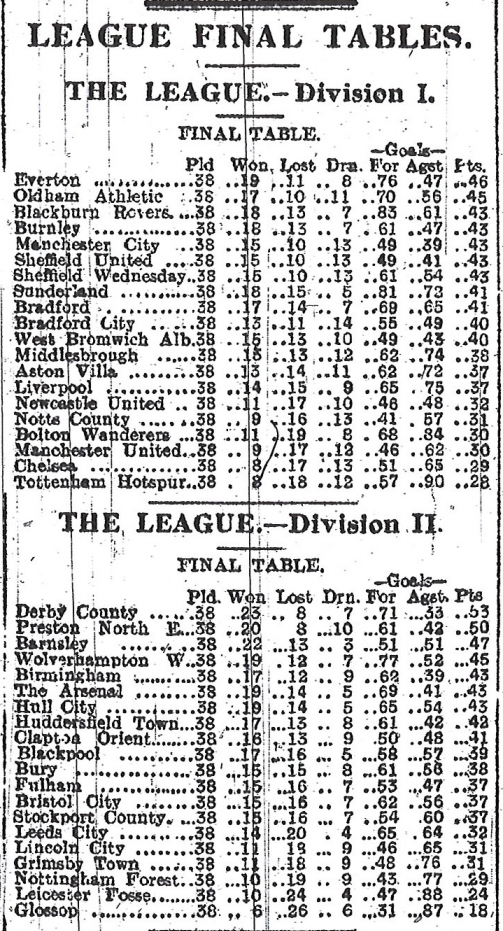
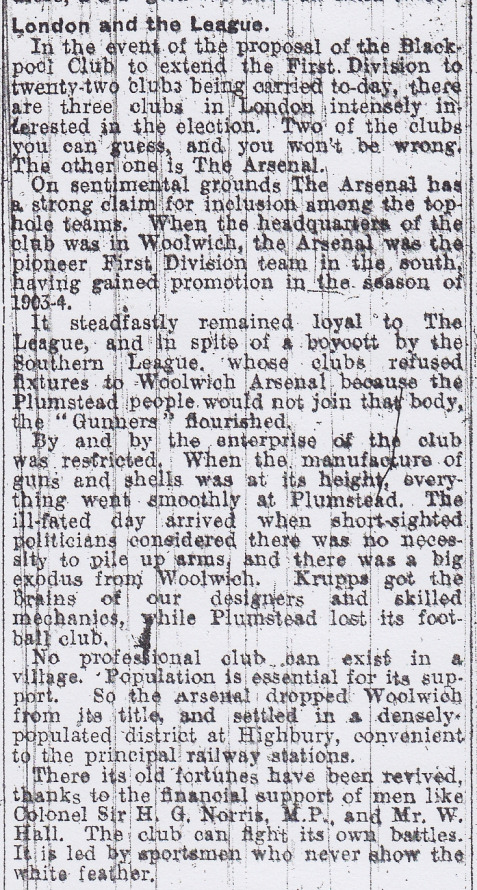
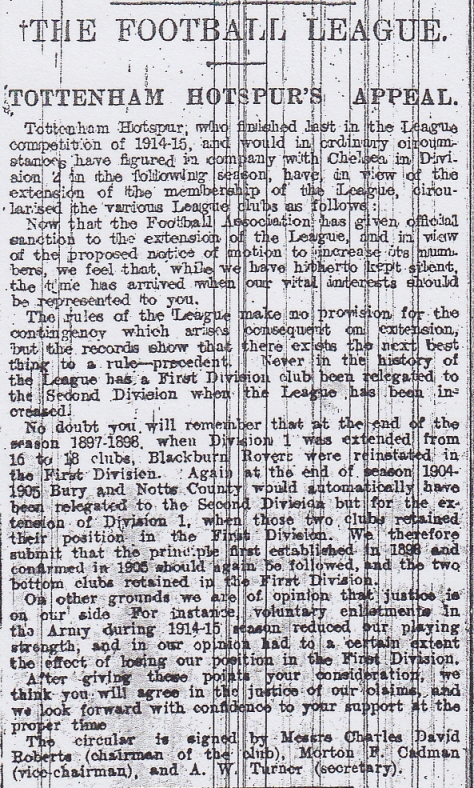

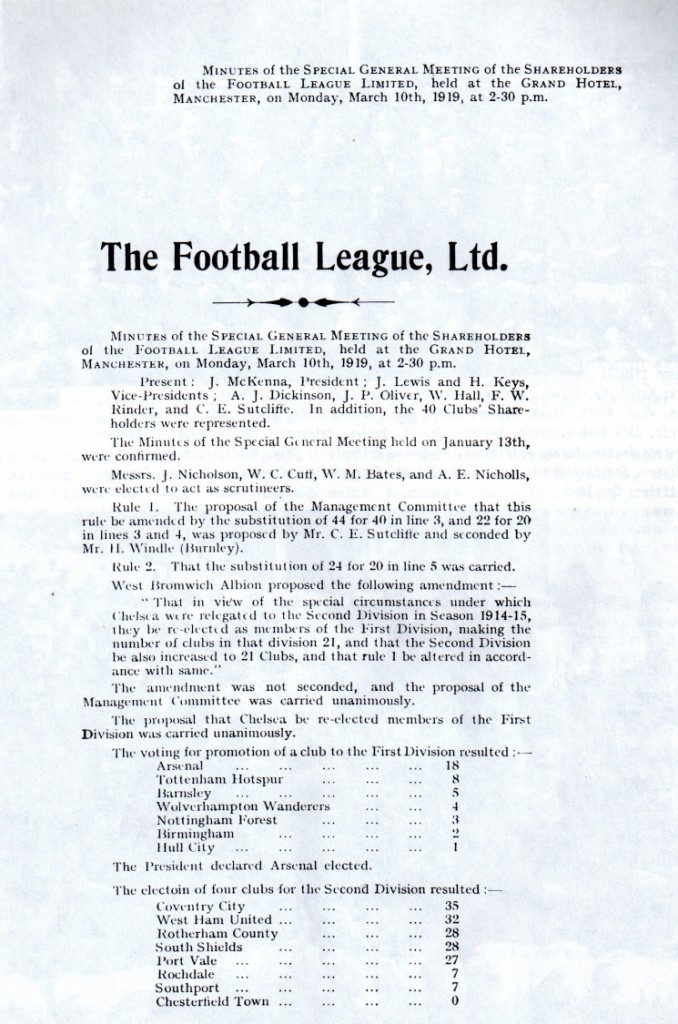
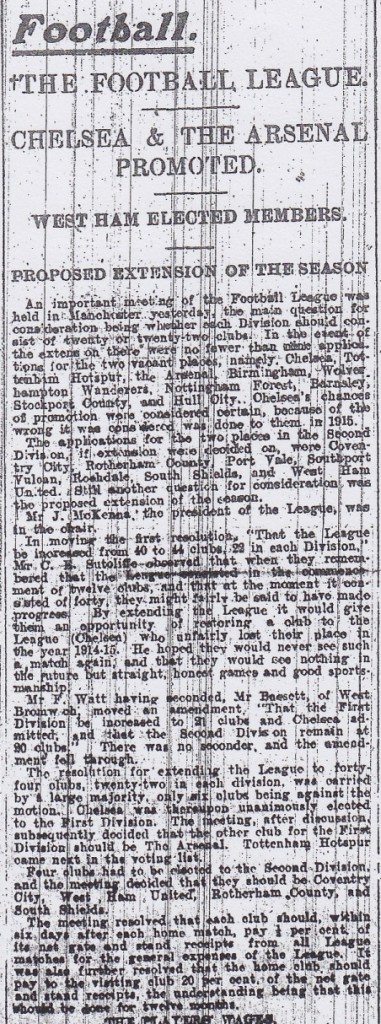
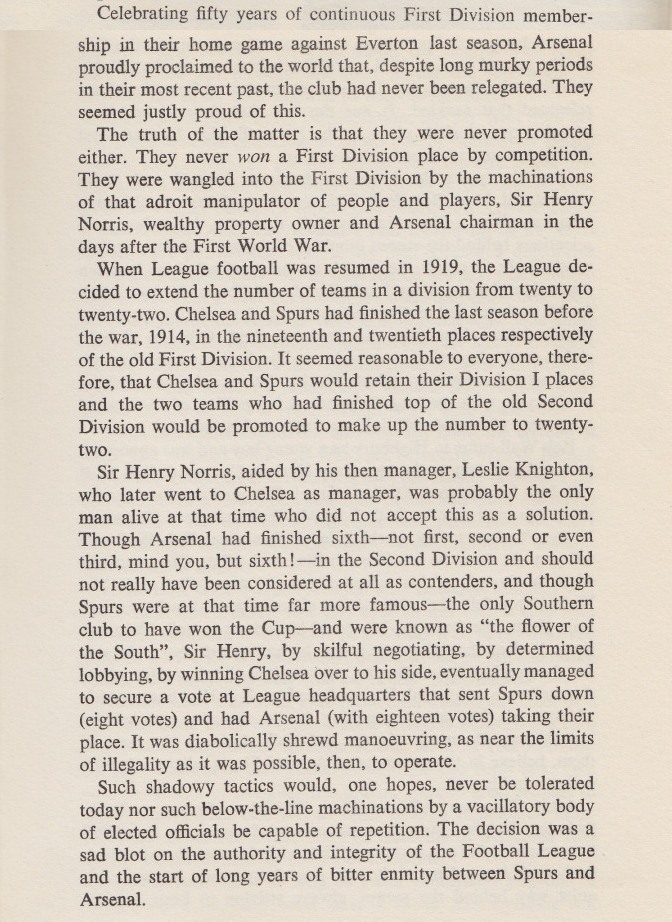

Well Ste, in terms of blindness I would not accuse you of that but I suspect you have not read the story of the election in detail on this site, or indeed if there is too much detail there for you, the summary of the story in the section https://untold-arsenal.com/100-years
Indeed the fact that you suggest Arsenal came sixth reveals a certain distance on your part from the reading of history – perhaps you are using some very old history books, or maybe that one written by the Tottenham supporter. The difference between him and us is that we went back and followed all the reports published day by day during the process – including the report in the local Tottenham newspaper after the election, and the very gracious comments by members of the Tottenham board.
But still, you stick to you favoured story if it makes you feel good.
Deference to website author, some wonderful entropy.
Hi, I have a question (or 2) regarding Henry Norris and 1919. Before asking, I want to see if you are still around for an answer?! Regards Ron
Ron I am certainly here, and indeed this blog is written every day.
Well if the league was to be expanded to 22, shouldn’t there have been two relegated, as normal, and four promoted, all based on finishing positions. Thus ensuring the best teams were in the top division? Oh, wait, politics!
Not really politics Kin but corruption. If you read the whole story you will see the pre-war there was wholesale corruption going on which had been reported to the Football League, but of which they would take no notice. However the final case was so extreme, they really had to do something to retain any belief in the fairness of football. It’s all in the articles if you want to read.